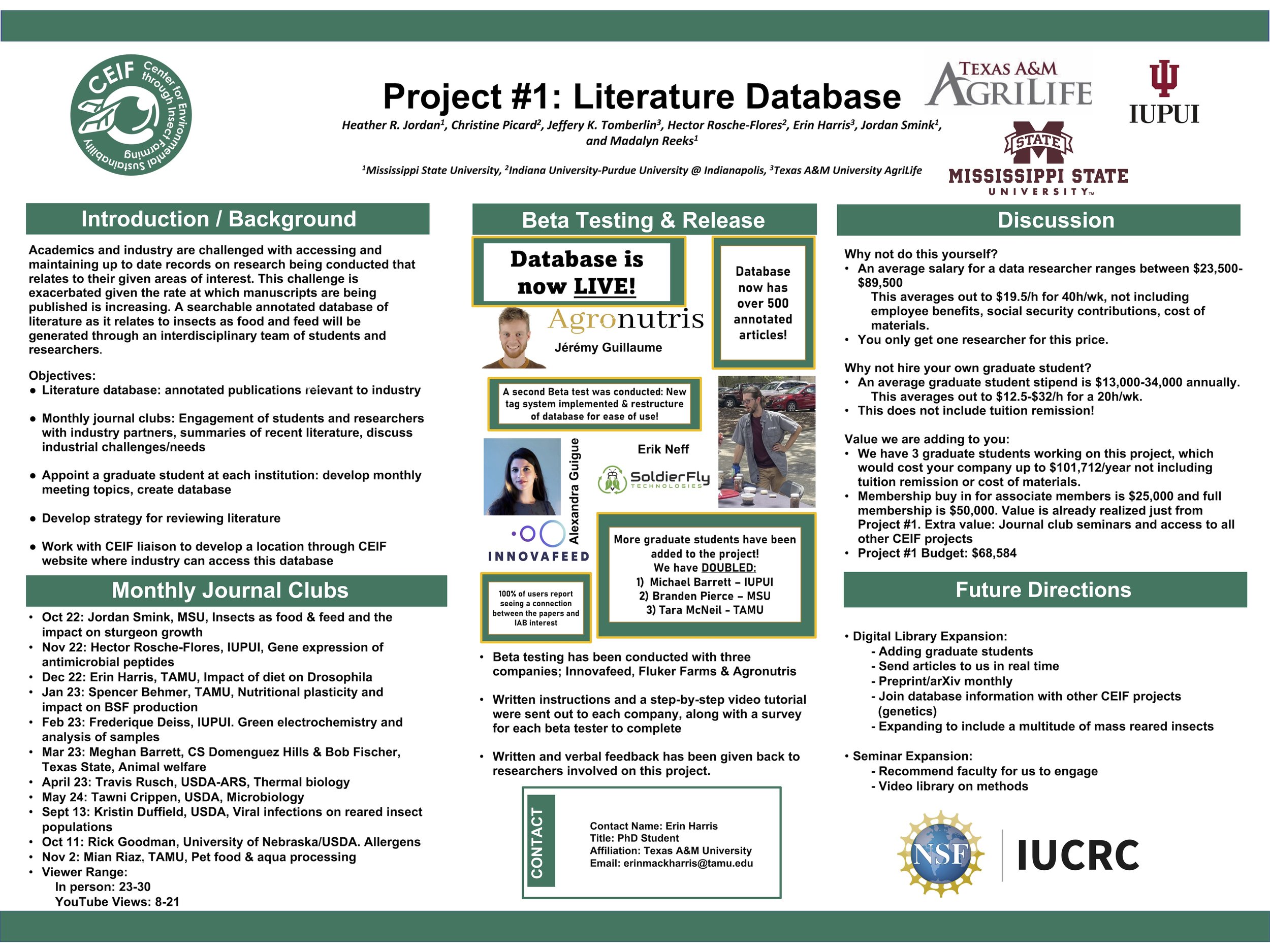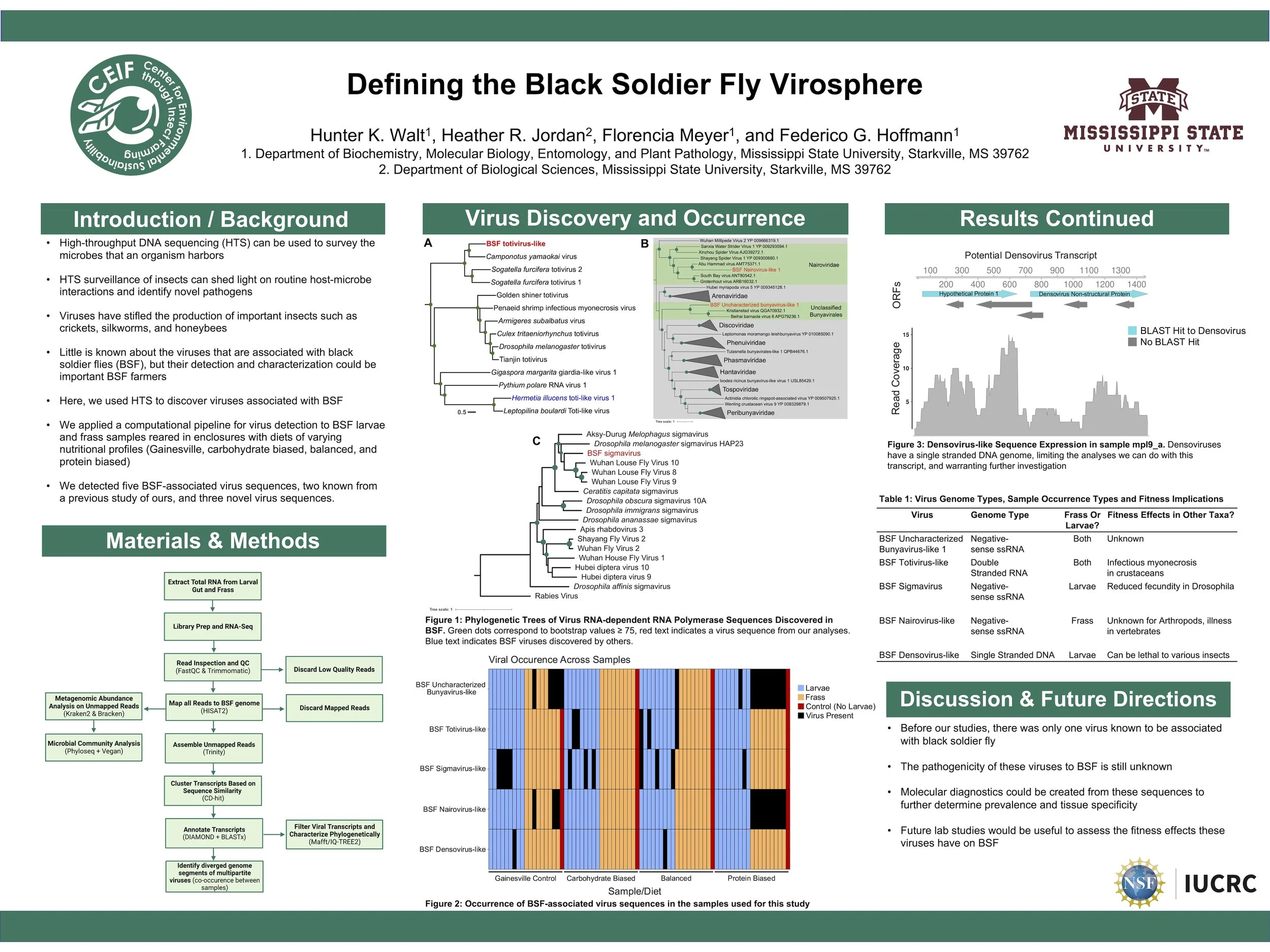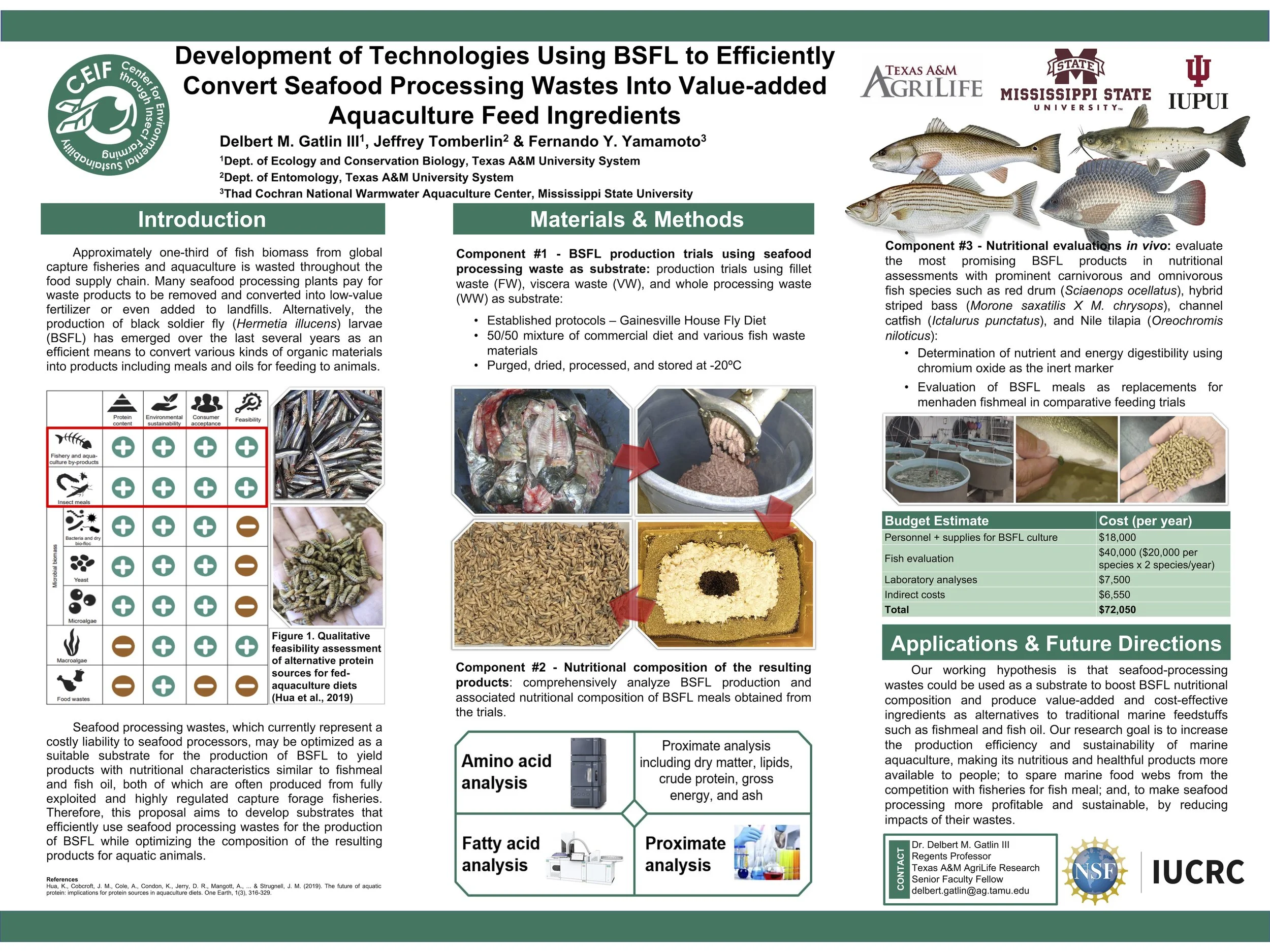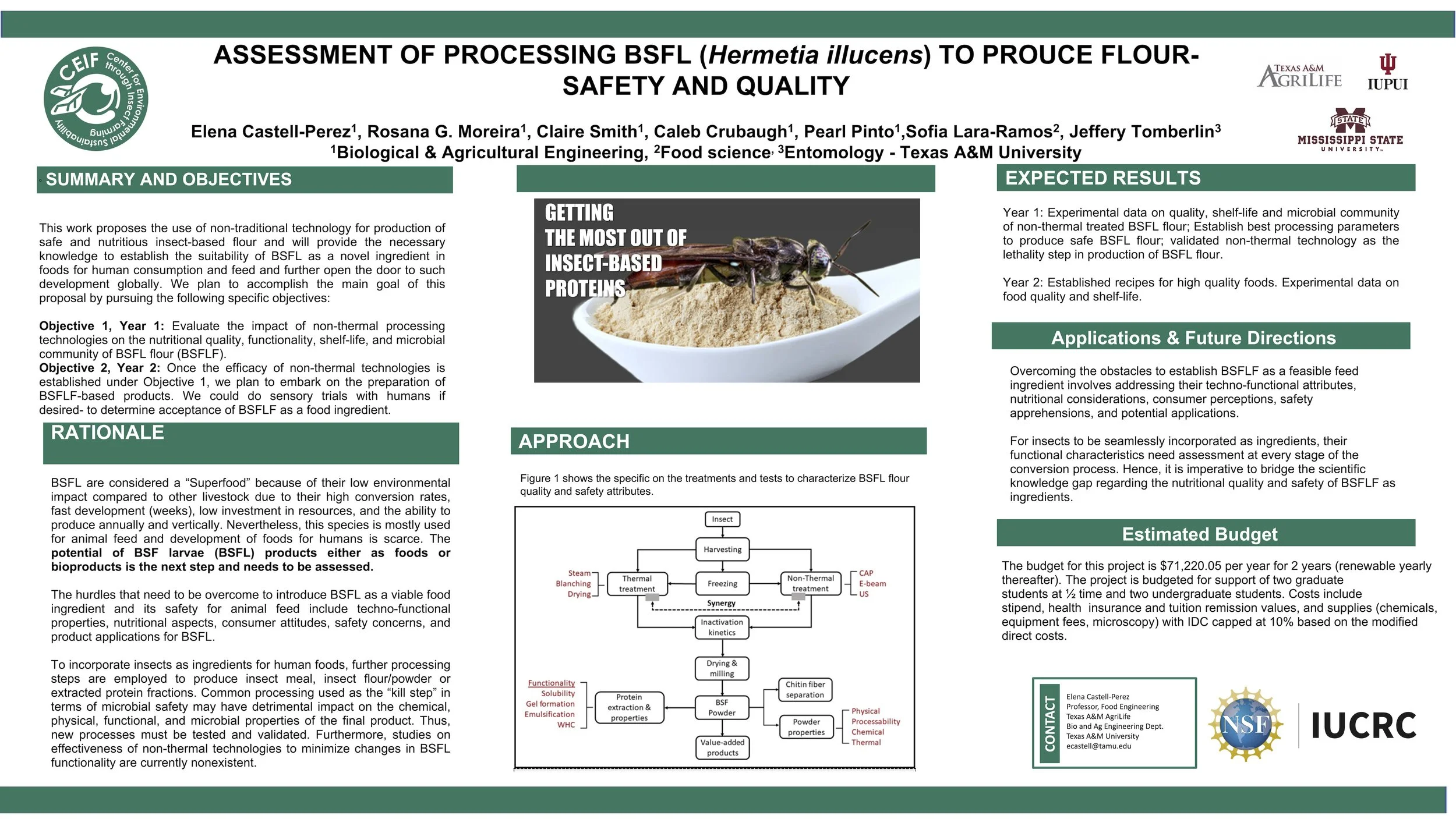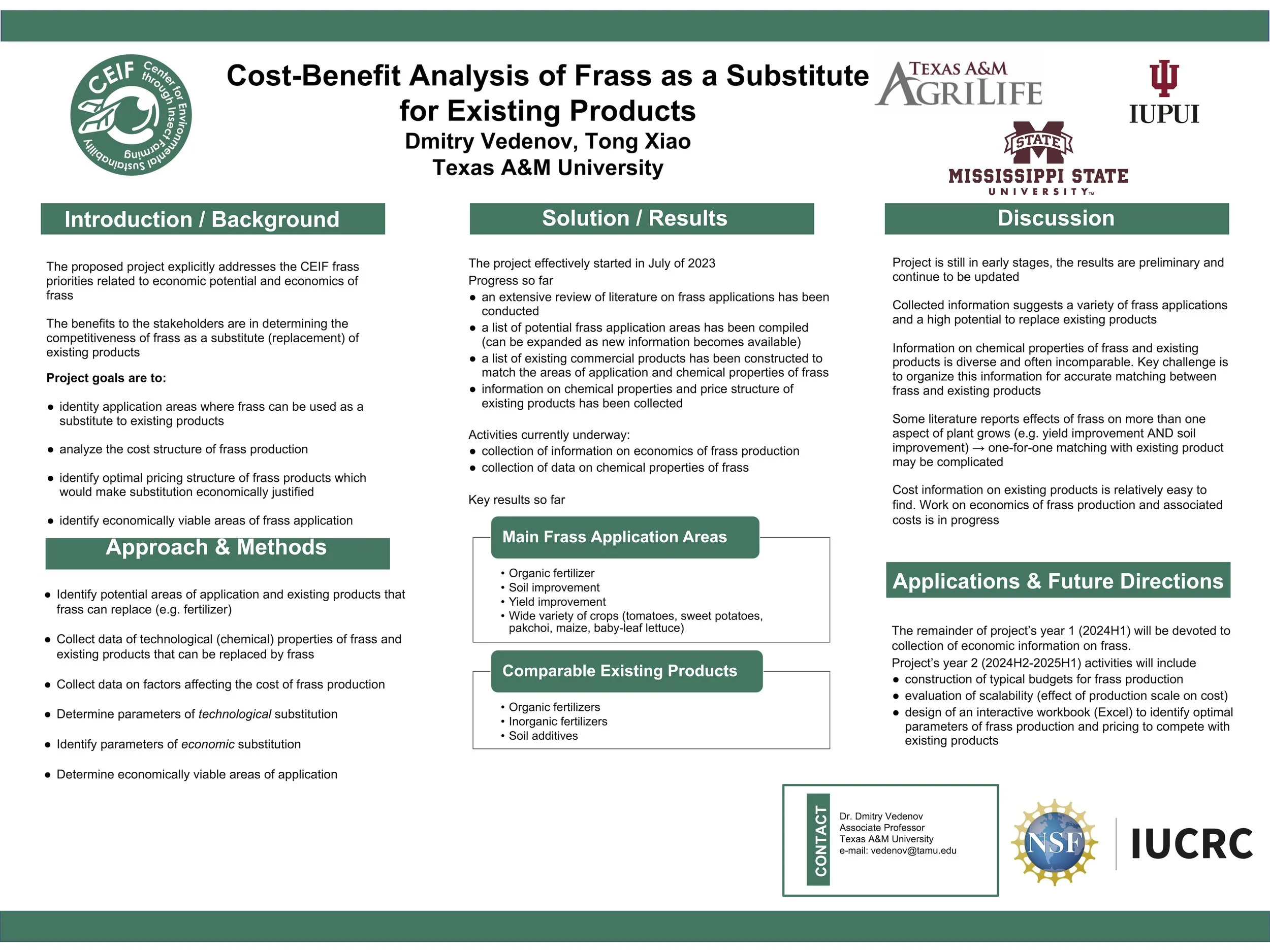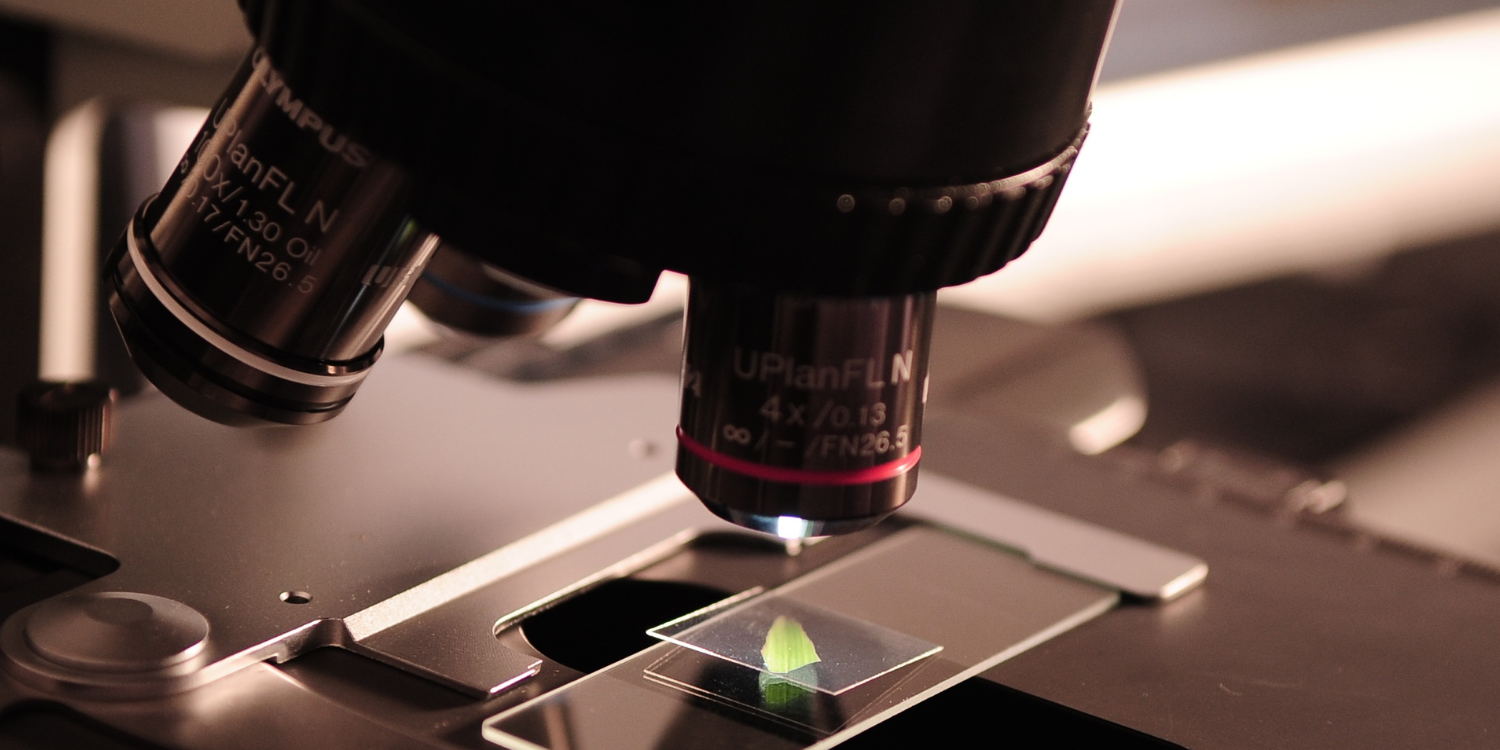
Research Thrusts
The Center for Insect Biomanufacturing and Innovation (CIBI) converges basic research needs with industrial applications for the insect agricultural industry. Research is driven by industry members that include insect producers and consumers of insect protein across a variety of species.
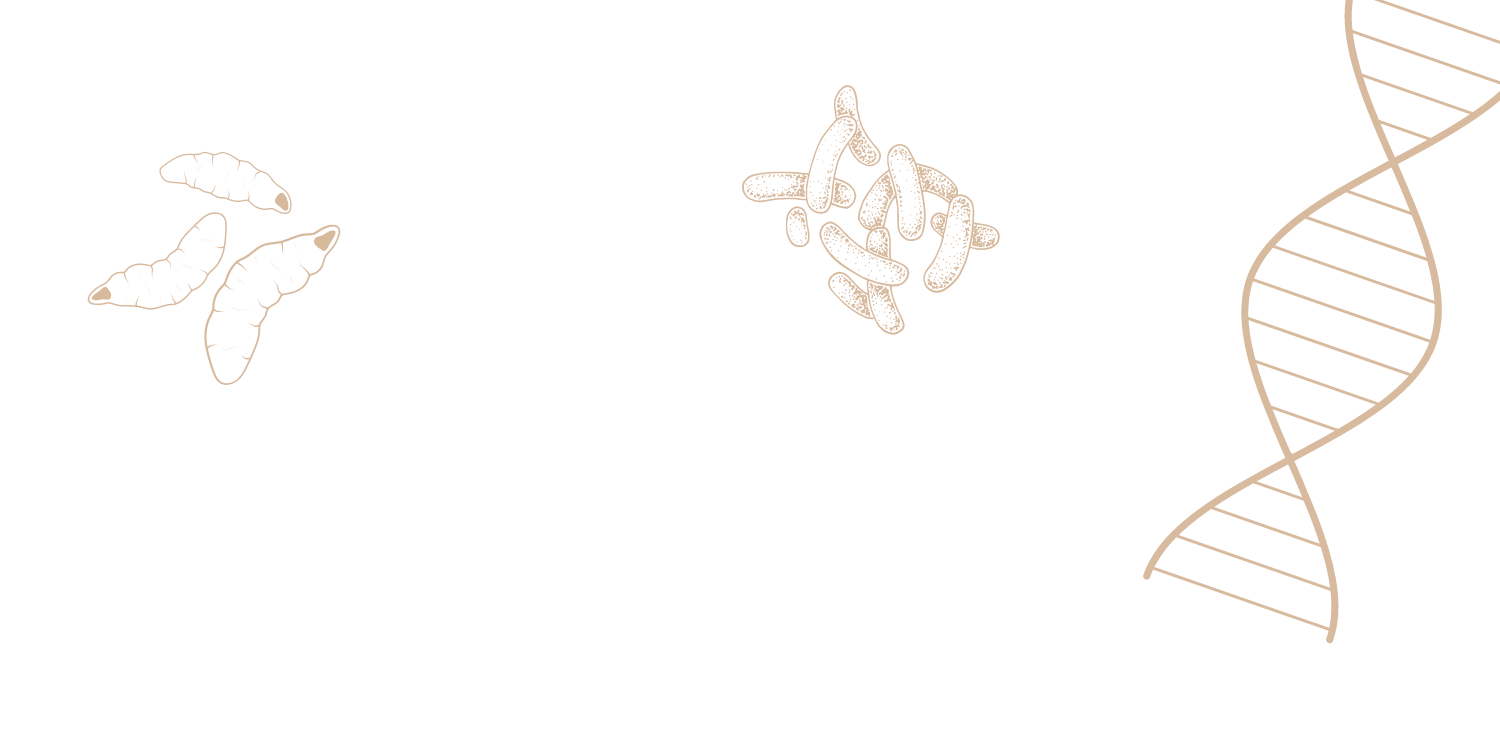
-

Production Optimization & Feed Trials
-

Insect Genetics & Genomics
-

Microbiology & Quality Assurance
Project Selection
Project selection, occurs once per year following extensive engagement between the researchers and industry members, may change based on industry membership as the membership grows.
Call for Proposals
CIBI Industry Advisory Board members are prompted to submit pre-competitive problems that CIBI can address through research early to mid-year. Full proposal talks will be presented at our Fall IAB meetings. Successful proposals are expected to begin research the following January.
Current Projects
| 1 | Digital Library & Seminar Series(formely Journal Club & Literature Database
PI(s): Dr. Jeffery K. Tomberlin, Dr. Christine J. Picard, Dr. Heather R. Jordan Researchers: Erin Harris, PhD Candidate, TAMU; Hector Rosche-Flores, Graduate Student, IUI; Jordan Smink, PhD Candidate, MSU Summary: Creates a searchable database of insect research and hosts monthly seminars to highlight relevant studies. Output: Comprehensive digital literature library and symposia recordings. |
2 | Genomic Resource Development and Validation
PI(s): Dr. Christine J. Picard, Hector Rosche Flores Researchers: Hector Rosche Flores (IUI), TBA (IUI) Summary: Characterizes genetic diversity in black soldier flies, crickets, and mealworms, validating gene predictions. Output: Sequence data, diversity estimates, SOPs. |
| 5 | (Completed) Evaluation Lauric Acid from Insects as a Therapeutic Agent against Pathogens in Shrimp
PI(s): Dr. Del Gatlin, Dr. Pedro Carvalho, Dr. Waldemar Rossi Researchers:Dr. Pedro Carvalho, TAMU; Dr. Waldemar Rossi, Assistant Research Professor, Kentucky State University Summary: Explores black soldier fly larvae meal as a disease-prevention method in shrimp aquaculture. Output: Peer-reviewed manuscripts, industry presentations. |
6 | Gut Health and Performance of Chickens raised on Insect Feed
PI(s): Giri Athrey Summary: Investigates the impact of insect-based diets on poultry gut health and overall performance. Output: TBD |
| 11 | Nutrition, Microbial Enhancements, and the Insect Interactome
PI(s): Dr. Heather Jordan, Dr. Spencer Behmer, Dr. Jeff Tomberlin, Dr. Christine Picard Researchers:Hunter Walt (MSU), Jordan Smink (MSU), Hector Rosche-Flores (IUPUI) Summary: Analyzes insect gut microbiomes and their effects on nutrition and performance. Output: Phenotypic data, microbial transcriptomics, insect transcriptomics. |
12 | Cost-Benefit Analysis of Frass
PI(s): Dr. Dmitry Vedenov, Department of Agricultural Economics, TAMU Researchers: Yuhong Lei, Tong Xiao Summary: Assesses frass's economic potential by comparing it to existing products, helping CEIF stakeholders position and value frass in the market. Output: Interactive Excel workbook for IAB members. |
| 15 | Study of Frass-Associated Microbiome on Plant Growth and their Potential Use as Biofertilizers
PI(s): Dr. Shankar Ganapathi Shanmugam, Mississippi State University Co-PI: Dr. Jagman Dhillon, Mississippi State University Researchers: Jasmine Sahota Summary: Examines how insect frass can serve as a biofertilizer, studying its impact on soil microbes and plant growth. Output: Research on optimizing frass use for sustainable agriculture. |
16 | Assessing BSF Mating Behavior in the Neotropics
PI(s): Jeff Tomberlin, Co-PIs: Heather Jordan (MSU), Christine Picard (IUPUI) Summary: Examines the mating behavior of black soldier flies in the neotropics to inform mass-rearing practices. Output: TBD |
| 17 | Virome Evaluation Throughout the Fitness Spectrum
PI(s): Dr. Florencia Meyer, Animal Viruses, Mississippi State University, Dr. Federico Hoffmann, Bioinformatics, Mississippi State University Summary: Uses gene sequencing to analyze insect viruses in mass-rearing, linking their presence to insect performance for better management practices. Output: Sequence data, SOPs for virus discovery, cell culture methodologies. |
18 | Integrating Black Soldier Fly Larvae Production with Aquaculture Byproducts for Value-Added Feed Ingredients
PI(s): Dr. Delbert Gatlin, Department of Ecology and Conservation Biology, TAMU, Dr. Jeffrey Tomberlin, Department of Entomology, TAMU Researchers:Dr. Pedro Carvalho and Tara McNeil, TAMU Summary: Converts aquaculture waste into valuable fish feed using black soldier fly larvae to reduce waste and create sustainable feed alternatives. Output: Research data to be published, presented at CEIF meetings, and possibly at conferences. |
| 21 | Electrochemical Analysis / Green Chemistry
PI(s): Dr. Frédérique Deiss, Department of Chemistry and Chemical Biology, IUI Summary: Develops new methods to detect key molecules in insect farming and tests their environmental impact. Output: New, environmentally friendly electrochemical methods to detect important molecules like amino acids and food safety markers. |
23 | Assessment of BSFL (Hermetia illucens) to Produce Flour - Safety & Quality
PI(s): Dr. Elena Castell-Perez, Department of Biological and Agricultural Engineering, TAMU, Dr. Rosana Moreira, Department of Biological and Agricultural Engineering, TAMU, Dr. Jeffery K. Tomberlin, Department of Entomology, TAMU Summary: Assesses the safety and quality of BSFL flour production technology, focusing on its consumer acceptance. Output: Publications and research presentations. |
| 24 | Fingerprinting Industry Insect-Microbe Interactions
PI(s): Dr. Heather R. Jordan, Mississippi State University, Dr. Christine Picard, IUPUI, Dr. Jeffery K. Tomberlin, TAMU Summary: Studies how food substrates impact the health, development, and nutrition of mass-produced insects using advanced analysis. Output: Sequence data, diversity estimates, SOPs. |
39 | Developing a Validated, Robust, Rapid, and Cost-effective Analytical Method for Chitin in Insect-sourced Materials
PI(s): Dr. Ryan Dilger, University of Illinois, Urbana-Champaign Summary: Develops a robust, rapid, and cost-effective method for determining chitin levels in insect-sourced materials. Output: Literature review, validation metrics, and final protocol for chitin measurement. |
| 44 | Nutritional Assessment of BSFL to Support Nutritional Adequacy for All Life Stages of Feline Diets
PI(s): Dr. Maria R.C. de Godoy, University of Illinois, Urbana-Champaign Summary: Studies the safety and benefits of dried black soldier fly larvae (BSFL) in cats during pregnancy, lactation, and growth. Output: AAFCO-compliant research protocol, IACUC approval, formulated diets, and GLG study |
Publications
-
Hannah E. Shinnerl, Ian Banks, Ryan DilgerScience Direct, Vol. 371, 1 January 2026
Key words: Chitin, insect-sourced chitin, chitin quantification, analytical methods, glucosamine, N-acetylglucosamine, chitosan, insect exoskeletons, sustainable biomaterials, alternative proteins
Abstract
Chitin is an abundant aminopolysaccharide that serves as the basic structural molecule in certain animal lineages and fungi. Chitin is a diverse polymer with research and industrial applications across several disciplines. The primary source of chitin is the exoskeleton of arthropods, which include insects and crustaceans. However, chitin does not occur as a pure polymer, but rather as a complex matrix that integrates proteins, pigments, and minerals. Methods for analyzing chitin thereby must deal with the chemical complexity of these biological matrices. Accordingly, several analytical methods have been developed for chitin detection and quantification. Here we provide a detailed summary of methods for the quantification of chitin, with a focus on insect-based materials. These methods fall into several broad categories: proximate analysis, spectroscopic, electrophoretic and chromatographic separation paired with detection, chemical, and immunochemical. Also included is a discussion on methods for chitin purification, hydrolysis, and deacetylation. The aim of this review is to consolidate chitin quantification methodologies across diverse scientific disciplines, providing researchers with a comparative framework for selecting appropriate techniques based on their sample types, research objectives, and analytical constraints. By highlighting the strengths and limitations of each method, this review also seeks to guide future method development.
-
C.J. Picard, H.R. Jordan, J.K. Tomberlin
Journal of Insects as Food and Feed (JIFF), online publication date 4 Dec 2025.
Keywords: Insect agriculture, Insect biomanufacturing, Sustainable biotechnology, Insects as bioreactors, Circular bioeconomy, Bioremediation using insects, Insect biotechnology, Waste valorization, Insect frass soil amendment, Chitin and chitosan applications, Alternative protein systems, Sustainable agriculture innovation
Abstract: Over the past decade, insect agriculture has evolved from a focus on protein production to a broader vision of
insects as sustainable biomanufacturing platforms. Once hindered by regulatory, cultural, and economic barriers,
the field has emerged stronger through innovation and diversification. Insects now represent powerful tools for
biotechnology, bioremediation, and soil enhancement, offering solutions to global challenges such as pollution,
food security, and climate change. As living bioreactors, they enable medical and agricultural innovation, though
ethical and ecological safeguards remain essential for sustainable advancement.
-
Meghan Barrett, Jeffery K. Tomberlin, Artisan Spirit Magazine, Spring 2025, pp. 75-77.
Keywords: Waste Management, Spent Grain, Brewery, Distillery, Consumer Demand, Waste, Fertilizer, Composting, Innovation, Black Soldier Fly, BSF, Organic Waste, Larvae
Abstract: The increasing consumer demand for craft beverages has led to significant volumes of spent grain as a byproduct of brewing and distilling processes. This article highlights the challenges and costs associated with traditional spent grain management strategies. Recognizing the need for innovative solutions, the piece introduces the Black Soldier Fly (BSF) as a promising organic waste management option. BSF larvae are efficient consumers of spent grain, converting its nutrients into valuable biomass. This article explores the characteristics of BSF and their potential to transform a significant waste stream into a resource, offering a sustainable and potentially profitable alternative for the brewing and distilling industries.
-
Bukchin-Peles S, Baker Lozneva K, Tomberlin JK, Zilberman D, Future Foods 11: 100592. (2025)
Keywords: Black soldier fly, Bioeconomy, Circular economy, Supply chain, Policy
Abstract: The Black Soldier Fly (BSF), Hermetia illucens, represents a sustainable source of protein by converting organic waste into valuable products. BSF production requires minimal resources compared to traditional livestock and generates significantly lower greenhouse gas emissions (about 0.017 kg CO₂-eq per kg protein versus 57–500 kg CO₂-eq per kg protein for livestock). Diverting 1 % of global food waste to BSF production could yield an estimated 332,000 metric tonnes of protein annually and 1 million metric tonnes of organic fertilizer. This paper explores the economic, environmental, and operational dimensions of BSF production, focusing on supply chain strategies that optimize scalability and sustainability. Analyzing configurations such as vertical integration, distributed systems, and nucleus-plasma models, it identifies critical factors shaping supply chain design and environmental impacts. The findings emphasize the importance of supportive regulations, continued research investment, and strategic supply chain development.
-
Megido, R.C., et al. Entomologia Generalis, 44(1), pp.3-27. (2024)
Keywords: entomophagy, insect food, insect industry, insect farming, insect marketing
Abstract: There has been continuous and growing interest in edible insects. Worldwide, various levels of insect farming are emerging, ranging from small domestic farms to vertical farms reaching heights of 36 meters, accommodating several million growing insects. The appeal of insects lies in their ecological benefits, as they contribute to the valorization of underutilized organic residues while requiring minimal space and water. The selection of insect species is influenced not only by their biology and behavior but also by local preferences and customs, varying with the scale of production and geographical location. This review article aims to provide an updated overview of the main insect species produced across different continents, their current level of industrialization, and production prospects based on available literature.
-
MDPI research article by Hunter K Walt et al. (2024)
Keywords: virome; Sigmavirus; Totivirus; Hermetia illucens; virus Surveillance
Abstract: The mass rearing of animals in close quarters can be highly conducive to microbe transmission, including pathogens. This has been shown multiple times in the case of important industrial insects such as crickets, silkworms, and honeybees. One industrial insect of increasing importance is the black soldier fly (Diptera: Hermetia illucens), as it can convert organic waste into high-quality protein and fatty acids. Along with this, they take up far less space than traditional protein sources, as millions of black soldier flies can be reared in a relatively small facility. Because of this, there is a growing interest in the pathogens that could impact black soldier fly-rearing efforts. So far, only three black soldier fly-associated viruses have been identified. We used metatranscriptomic sequencing to survey black soldier fly guts, frass, and diet for viruses. We detected sequences from two novel viruses. One, which we name Hermetia illucens sigma-like virus 1, is phylogenetically related to viruses of the genus Sigmavirus, which have been highly studied in Drosophila. The other novel virus, which we name Hermetia illucens inse-like virus 1, is the second double-stranded RNA virus of the order Ghabrivirales described in the black soldier fly, and groups within a new family of insect viruses called the Inseviridae. We also detected two black soldier fly-associated viruses previously identified by our group: BSF nairo-like virus 1 and BSF uncharacterized bunyavirus-like 1. Consistent with our previous study, these two viruses are found primarily in frass samples and occur together more often than expected at random. When analyzing host transcription, we found significant differences in gene expression for eight candidate antiviral genes in the black soldier fly when comparing samples with and without viral sequences. Our results suggest that black soldier fly–virus interactions are ongoing, and they could be of interest to black soldier fly producers
-
Journal of Economic Entomology research article by Delbert M. Gatlin et al. (2024)
Keywords: bioeconomy, circular economy, sustainability
Abstract: The current study evaluated the potential enhancement of lauric acid (LA) in black soldier fy, Hermetia illucens, (L.) (Diptera: Stratiomyidae) larvae (BSFL), a source of this short-chain fatty acid which has antimicrobial and immunostimulatory properties. Replicate groups of BSFL were reared on either the coconut or Gainesville diet for 7 days. After the rearing period, BSFL were harvested, purged, dried, and subjected to proximate, fatty acid and amino acid compositions, and pepsin digestibility analyses. Results demonstrate changes in proximate composition. BSFL reared on the coconut had signifcantly (P = 0.002) higher lipid content (47.3% vs. 25.2%) on a dry-matter basis. The LA concentration in BSFL produced on the coconut was 31% greater than those reared on Gainesville, resulting in almost 150% more LA. Furthermore, BSFL-fed coconut had reduced crude protein (29.7% of dry weight) and ash (3.7% of dry weight) relative to those fed Gainesville (43.4% and 7.5% for crude protein and ash, respectively) but higher pepsin digestibility (91.0% vs. 87.0%). The relative amounts of various amino acids in the 2 BSFL meals did not differ extensively, with statistically lower concentrations of only phenylalanine and tryptophan and higher concentrations of alanine, arginine, isoleucine, leucine, and serine in BSFL reared on coconut. Results demonstrate that the nutritional composition of BSFL can be manipulated, and an enhancement of LA concentrations of 150% was achieved with coconut, which has value for BSFL as a feed for various livestock, including aquaculture. Lower protein content is a tradeoff in terms of BSFL value as a feed additive
-
Tomberlin, J.K., et al. Animal Frontiers 13: 64-71. (2023)
Keywords: Black Soldier Fly, BSF, BSFL, Food Waste, Waste Management, Sustainable Agriculture, Insect Protein, Animal Feed, Circular Economy, Organic Waste, Hermetia illucens, Frass (insect digestate), Soil Amendment, Essential Amino Acids, EAAs, Circular economy and insect farming, Research on optimizing black soldier fly production
Abstract: The growth of the global human population mandates expansion of the agricultural sector to meet food demands. Paradoxically, food waste is detrimentally impacting our land, air, and water.
The insects as food and feed sector can bridge these two concerns by recycling organic wastes to produce ingredients for feeding people, livestock, poultry, aquaculture, and pets. The black soldier fly is a key species mass produced for feed and possibly food. This species is globally distributed, not a pest, and can recycle a broad range of organic residues while producing insect biomass (i.e., larvae) that is approved for use globally as a feed ingredient.
Currently, there are facilities that can digest 100 tons of organic waste with the black soldier fly daily. However, predicting output from such processes is challenging for numerous reasons. A key limitation of the system is the proper management of diverse wastes.
Due to the nutritional complexities of food waste, predicting conversion rates of waste to insect biomass is challenging. In many instances, the ability of the insect to do so could be hampered due to limited nutrients such as nutritionally essential amino acids (EAAs). Determining the impact of EAAs on the life-history traits of the black soldier fly, or any other insect mass produced for such purposes, is critical for optimizing the industry.
-
Walt, H.K., et al. Viruses. 2023 Jul 29;15(8):1654.
Keywords: Bunyavirus; Hermetia illucens; bioinformatic surveillance; black soldier fly; high-throughput sequencing; novel virus; viromics
Abstract: The black soldier fly (Hermetia illucens, BSF) has emerged as an industrial insect of high promise because of its ability to convert organic waste into nutritious feedstock, making it an environmentally sustainable alternative protein source. As global interest rises, rearing efforts have also been upscaled, which is highly conducive to pathogen transmission. Viral epidemics have stifled mass-rearing efforts of other insects of economic importance, such as crickets, silkworms, and honeybees, but little is known about the viruses that associate with BSF. Although BSFs are thought to be unusually resistant to pathogens because of their expansive antimicrobial gene repertoire, surveillance techniques could be useful in identifying emerging pathogens and common BSF microbes. In this study, we used high-throughput sequencing data to survey BSF larvae and frass samples, and we identified two novel bunyavirus-like sequences. Our phylogenetic analysis grouped one in the family Nairoviridae and the other with two unclassified bunyaviruses. We describe these putative novel viruses as BSF Nairovirus-like 1 and BSF uncharacterized bunyavirus-like 1. We identified candidate segments for the full BSF Nairovirus-like 1 genome using a technique based on transcript co-occurrence and only a partial genome for BSF uncharacterized bunyavirus-like 1. These results emphasize the value of routine BSF colony surveillance and add to the number of viruses associated with BSF.
-
Tomberlin, J. K., et al. Journal of Insects as Food and Feed 8.2 (2022): 109-111.
Keywords: Insect Farming, Insect Food, Insect Feed, Sustainable Agriculture, Protein Demand, Circular Economy, Industry-University Cooperative Research Centers (IUCRC), Center for Environmental Sustainability through Insect Farming (CEIF), National Science Foundation (NSF), Sustainable insect farming for animal feed, Challenges and opportunities in the insect food industry, Creating a circular economy through insect agriculture
Concept Posters & Topics of Interest
Presentations
-
E. Kooienga, J. Cammack, F. Yang, J. Tomberlin, and H. Jordan. Entomological Society of America Southwestern Branch Meeting, Fort Worth, TX
-
CJ Picard. Insects Feed the World Conference, Quebec City, Canada
CJ Picard. RECIPE – Decentralized Production and Genetic Conservation of Farmed Insects Symposium, Aarhus, Denmark
-
CJ Picard. Ecological Society of America Southwestern Branch Meeting, Fort Worth, TX
-
CJ Picard. AGSx Arthropod Genomics Symposium
-
JK Tomberlin. School of Biology & Ecology, University of Maine.
-
JK Tomberlin., M Barrett, S.Y. Chia, B. Fischer, and C. Li. Insecta Conference, Geißon, Germany.
-
JK Tomberlin. Insects as Food and Feed Summer School, Wageningen University, the Netherlands.
-
JK Tomberlin. Insects as Food and Feed Summer School, Wageningen University, the Netherlands.
-
JK Tomberlin. Virtual presentation: City University of Hong Kong, Hong Kong, China.
-
JK Tomberlin., C. Picard, H. Jordan, and C. Preyer. Insects to Feed the World, Quebec City, Canada.
-
JK Tomberlin. Virtual presentation: University of Derby, United Kingdom.
-
JK Tomberlin, and C. Preyer. Opportunities for Montana State University. Bug Buffet, Bozeman, Montana.
-
JK Tomberlin. Virtual presentation: IE Business School, Austral Group, Madrid, Spain.
-
JK Tomberlin. Department of Crop and Soil Sciences, Texas A&M University, College Station, Texas.


